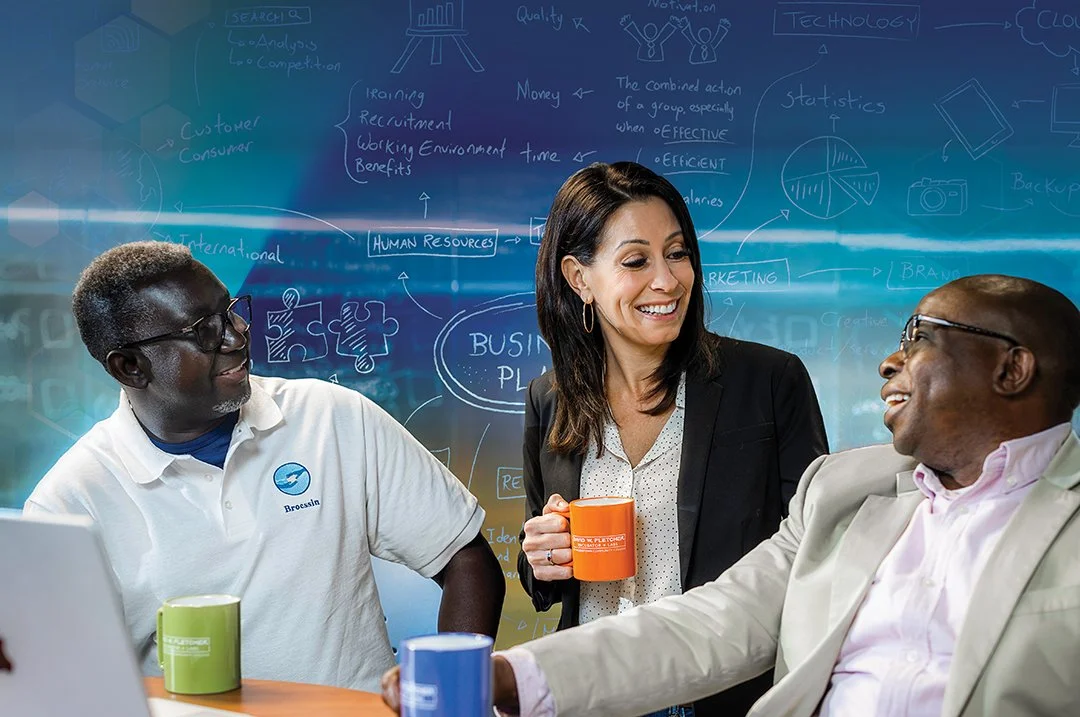Home Grown Entrepreneurship
New businesses are growing at HCC's Incubator + Labs
By Allison Hurwtiz
Photos by Turner Photography
Every year in the US, there are tens of thousands of new business start-ups, only a fraction of which will become successful companies. Business incubators- special programs combining office and work space, specialized training and mentorship - can guide these entrepreneurs as they turn their dreams into reality.
At Hagerstown Community College, the David W. Fletcher Incubator + Labs is paving the path for a diverse and inspiring set of businessmen and women as they embark on new ventures.
The dynamo behind the program, Justina Shaw, is gregarious and disarming - a natural coach. She is, in her words, an entrepreneur who created the program for other entrepreneurs.
In her role as Director of the HCC Business Incubator, Shaw serves as personal advisor, confidant, and cheerleader for every entrepreneur that sets up shop within its walls.
Compartmentally, there are two different incubators in the program - the Mama’s Biscuits Culinary Incubator and the David W. Fletcher Incubator + Labs.
“Those are the two worlds, but we all collide, we work together, we have fun, although the training and development is different,” says Shaw.
The David W. Fletcher Incubator + Labs is spread over three floors of the new bright and airy Center for Business and Entrepreneurial Studies building on the Hagerstown Community College campus. Wet labs (think science experiments, beakers, etc.) are located on the first floor, along with private lab spaces. The second-floor houses offices for solely entrepreneur ventures, while the third floor contains offices for businesses with employees. Businesses housed here range from cybersecurity to biotech and life science, to software development, and services.
Mama’s Biscuits Culinary Kitchen is a generously sized commercial kitchen used for catering as well as manufacturing consumer packaged goods. Each culinary business in the program receives 24/7 access to the kitchen, designated space for dry storage and refrigeration, and $2,000 allocated towards the purchase of new equipment.
The fee for using the culinary incubator is $15-30/hour with a maximum charge of $250/month, while the business labs charge a flat rent for occupancy, ranging from $70-$390/month. Currently, the office space is at capacity with 45 tenants.
But the incubator program is much, much more than just an office space or kitchen use. Shaw and other faculty and mentors offer guidance on every step of the process, from developing speaking skills, to creating business plans, and selecting storefronts. As part of the program, entrepreneurs must attend bi-weekly seminars focusing on different aspects of business operations and meet with the mentors (at minimum four) hand-picked for the benefit of their business.
Shaw explains, “We always do a peer-to-peer, so you have someone who’s already in the program to help you navigate. We have a connector- someone who is going to help you introduce your business to the community. Then we have someone that’s an industry expert, and then we have a mentor based on your action plan. So, let’s say you’re someone who’s very shy and doesn’t like speaking, we partner you with someone who loves coaching people and speaking. Let’s say you have a service-based company and don’t do well with sales, your direct mentor is someone who’s good at sales.”
“Sometimes you’re like, ‘My idea is great!’ and it really ain’t. And so, we work with you to fine-tune the idea so that when you’re ready to go to market and get out there and introduce it to the world, you have a product that the community wants,” says Shaw.
Williamsport native Wornden Ly runs a photography business primarily focusing on sports, events, and weddings. Originally, he was attracted to the HCC program for its high-speed internet capacity and office space. (As a digital photographer, Ly was regularly uploading or downloading “gigabytes and gigabytes” of files.)
Within a week’s time, Ly had taken a tour, met with Shaw, and signed a lease to become one of the first occupants of the incubator. Working with a mentor and other burgeoning entrepreneurs has helped Ly establish a reputable business.
“I came from a marketing background, but I never had sales experience or a traditional business operation. The mentors I was assigned to have a wealth of experience running a business. One of them was more sales-oriented,” Ly recalls. “I was very shy doing phone calls. I could do emails easily or messaging, but struggled with giving a sales pitch. He definitely helped me along with that aspect.”
“A lot of photographers sort of do it on the side but they don’t really have a fully functioning business,” he says. “Being able to legitimize my business has helped me establish credibility.”
All businesses in the incubator program will operate out of Washington County, adding jobs, services, and resources locally.
"In any good community economic development plan, there has to be a slice for entrepreneurs." - HCC President Dr. Jim Klauber
“In any good community economic development plan, there has to be a slice for entrepreneurs,” says HCC President Dr. Jim Klauber. “And we’ve got to provide a hub of support with wrap-around services to help them get off the ground and be successful. To incubate.”
“We try and get those folks who are serious about wanting to [start a business], maybe scared to death, and getting them there. I see that as a great investment as being a part of the overall economic development plan for Washington County,” says Klauber.
Exciplex is an ag-tech diagnostics start-up in the early stages of developing new systems to detect poisons in animal feed. Chemist Dr. Daryl Staveness founded the company in Michigan, but relocated to this region when his wife took a position at Shepherd University.
In late 2021, he moved the company’s research and development department to the incubator at HCC. Staveness calls the incubator a “saving grace,” as there isn’t an abundance of available lab space outside of the DC-area biotech hub.
As a non-native, Staveness says the Washington County region is a pretty great spot to be.
“We’re away from the really high price-points of Frederick or Rockville or Gaithersburg, but still within striking distance to recruit talent from those places,” he says. “As Exciplex builds out our innovation core in this area, ideally it will mean we’ll be growing, bringing some high-paying jobs to the area, retaining talent in the area, as well as maybe recruiting outside talent.”
Entrepreneurs in the program benefit from working in close proximity to other start-ups, in a sort of melting pot of business types and types of people. Klauber credits Shaw for cultivating the notable diversity of the program.
“It is a tapestry to diversity and inclusion and it’s fantastic and I love it and I give her all the credit for it,” says Klauber. “I’m really proud of all she’s done, and we do have a diverse incubator, probably the most diverse in Maryland. And that we’re west of South Mountain, that makes it even better.”
“I wanted to create a safe space for people of all races, genders, identities,” says Shaw. “I do not care how you identify because entrepreneurship is an equalizer. I truly believe diversity and inclusion come from entrepreneurship.”
In 2015 Daphney Michelle Smith founded Broker Builder Solutions, which streamlines technology for Human Resources departments, after working in the insurance industry for many years. What started as a consulting company has evolved into software development since moving into the incubator, a step that was fostered by the supportive environment there.
“It’s been hard for me to grasp that I am now a technology company. Being in the incubator, Justina drives it home, ‘Daphne, you’re a tech company. You need to see it, you need to believe it, you need to own it. That’s what you are now,” Smith says.
“Normally if you’re in the life sciences or biotech and you go to an incubator, it’s just a biotech incubator and you’re very much separated from the community,” says Exciplex’s Staveness. “But here, even though we have lab space, we’re integrated with a culinary incubator, and real estate, and digital marketing, so we already feel that we’re treated more as a small business rather than just a life science startup, which is really nice.”
“It’s a collaborative space,” attests photographer Ly. “We talk about our issues and problems, and we bounce back ideas on how we can make our businesses more efficient and better.”







